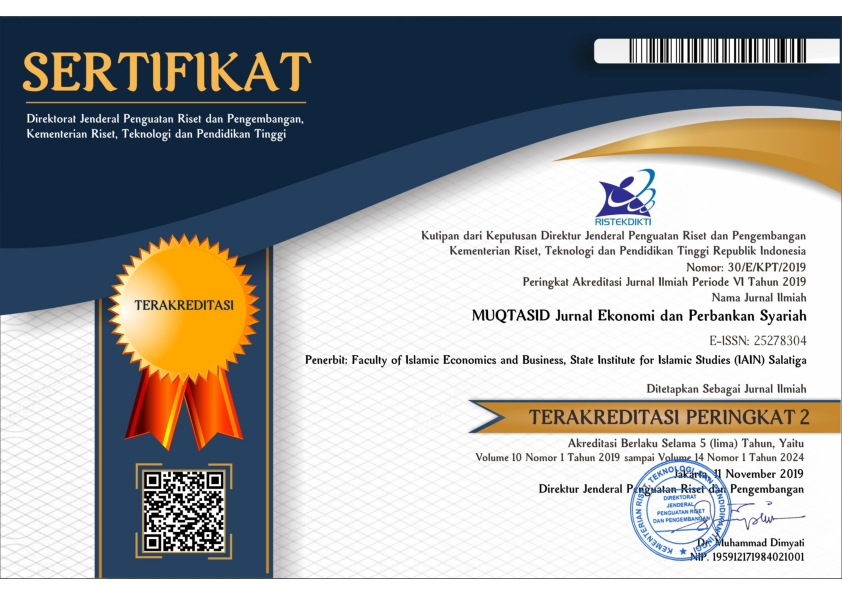Model Pengembangan Industri Halal Food di Indonesia
Abstract
Abstract
The development of the halal industry will become more competitive with the involvement of the financial industry and sharia banking sectors. This study aims to explore the role of sharia banking in the development of halal food industry in Indonesia. The research method used is descriptive qualitative method with literature review. Based on the results of the analysis, it can be concluded that the role of sharia banking is not only limited to shariah-based financing which is riba (interest), maysir (uncertainty), and gharar (gambling), but also at all stages of production process (halal value chain management). Sharia banks play important role that can use to develop and improve the halal food industry. First on the halal control stage, the second on the logistics process and the last stage of halal verification.
Abstrak
Pengembangan industri halal akan menjadi lebih kompetitif dengan keterlibatan dari sektor industri keuangan dan perbankan syariah. Penelitian ini bertujuan untuk mengeksplorasi peran perbankan syariah dalam pengembangan industri makanan halal di Indonesia. Metode penelitian yang digunakan adalah metode kualitatif deskriptif dengan telaah literatur. Berdasarkan hasil analisis, dapat disimpulkan bahwa peran perbankan syariah tidak hanya terbatas pada pembiayaan berbasis syariah yang bebas riba (bunga), maysir (ketidakpastian), dan gharar (perjudian). Akan tetapi juga pada seluruh tahapan proses produksi (halal value chain management). Peran penting yang dapat dilakukan perbankan syariah guna mengembangkan dan meningkatkan industri makanan halal, diantaranya dalam tiga proses halal integrity. Pertama pada tahap pengendalian halal, kedua pada proses logistik dan terkahir tahap halal verification.
Keywords
Full Text:
PDFReferences
Awang, M. D., Noor, M. N., Muhammad , J., Abdullah, A., Rahman, S., & Yahya, M. H. (2016). Acceptance and Application of Islamic Financial Planning among Small and Medium Enterprises Halal Operator in Peninsular of Malaysia. IJASOS- International E-Journal of Advances in Social Sciences, Vol.II, Issue 6.
Bohari, A. M., Cheng, W. H., & Fuad, N. (2013). An analysis on the competitiveness of halal food industry in Malaysia: an approach of SWOT and ICT strategy. Malaysia Journal of Society and Space 9 issue 1, 1-11.
Gillani, S. H., Ijaz, F., & Khan, M. M. (2016). Role of Islamic Financial Institutions in Promotion of Pakistan Halal Food Industry. Islamic Banking and Finance Review 3 (1), 29-49.
Jaafar, H. S., Endut, I. R., Faisol, N., & Omar, E. N. (2011). Innovation in logistics services – halal logistics. the 16th International Symposium on Logistics (ISL) (pp. 844-851). Berlin: ISBN: 978-085358-279-3.
Lahsasna, A. (2010). Understanding Shariah Financial Planning. Financial 1st Journal, January 2010 Issue, Malaysia Financial Planning Council, 40-41.
Lembaga Pengkajian Pangan, Obat-Obatan dan Kosmetika. 2008. General Guidelines Of Halal Assurance System Lppom Mui Majelis Ulama Indonesia (LPPOM MUI).
Manzouri, M., Ab-Rahman, M. N., Zain, C. R., & Jamsari, E. A. (2014). Increasing Production and Eliminating Waste through Lean Tools and Techniques for Halal Food Companies. Sustainability, ISSN 2071-1050.
Noordin, N., Noor, N. L., & Samicho, Z. (2014). Strategic Approach to Halal Certification System: An Ecosystem Perspective. International Halal Conference, PWTC (pp. 79-95). Kuala Lumpur: Procedia - Social and Behavioral Sciences 121.
Omar, E. N., & Jaafar, H. S. (2011). Halal supply chain in the food industry - A conceptual model. ISBEIA 2011 - 2011 IEEE Symposium on Business, Engineering and Industrial Applications, (pp. 384-389). Langkawi.
Qardhawi, M. Y. (1993). Halal dan Haram dalam Islam. PT. Bina Ilmu.
Samori, Z., Salleh, N. Z., & Khalid, M. M. (2016). Current trends on Halal tourism: Cases on selected Asian countries. Tourism Management Perspectives 19, 131-136.
Soon, J. M., Chandia, M., & Regenstein, J. M. (2017). Halal integrity in the food supply chain. British Food Journal Vol. 119 No. 1, 39-51.
Talib, M. S., & Hamid, A. B. (2013). Halal Logistics in Malaysia: a SWOT Analysis. Jornal of Islamic Marketing.
Tan, M. I., Razali, R. N., & Husny, Z. J. (2013). The Adoption of Halal Transportations Technologies for Halal Logistics Service Providers in Malaysia. International Journal of Mechanical, Aerospace, Industrial, Mechatronic and Manufacturing Engineering Vol:6, No:3.
Thomson Reuters. (2016). State of the Global Islamic Economic Report 2016/2017.
Tieman, M. (2013). Establishing The Principles In Halal Logistics. Journal of Emerging Economies and Islamic Research Vol.1 No.1.
Internet:
Akbar, R, J. (2017, 26 Juli). “Bukti Industri Halal Bisa Jadi Sumber Pendapatan Pemerintah”. Tersedia di: http://m.viva.co.id/berita/bisnis/939694-bukti-industri-halal-bisa-jadi-sumber-pendapatan-pemerintah (diakses pada 26 Juli 2017).
Kemenperin Bikin Kawasan Industri Halal (http://www.kemenperin.go.id/artikel/14913/Kemenperin-Bikin-Kawasan-Industri-Halal.) Diakses pada 20 Juli 2017.
Menjadi Penonton di Industri Halal (https://tirto.id/menjadi-penonton-di-industri-halal-bsGP) diakses pada 30 Mei 2017.
DOI: https://doi.org/10.18326/muqtasid.v9i1.1-13
Refbacks
- There are currently no refbacks.

MUQTASID by http://muqtasid.iainsalatiga.ac.id/ is licensed under a Creative Commons Attribution-ShareAlike 4.0 International License.
MUQTASID Jurnal Ekonomi dan Perbankan Syariah UIN SALATIGA p-ISSN: 2087-7013, e-ISSN: 2527-8304




